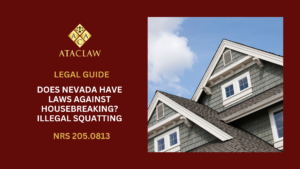In Nevada, the concept of housebreaking often confuses many. Primarily seen as an issue of wrongful residency or the infamous “squatting,” housebreaking extends beyond just occupying another’s property without permission. ATAC LAW is here to clarify the key aspects and legal repercussions of Nevada’s stance on housebreaking, under NRS 205.0813.

What does Housebreaking mean in Nevada?
In Nevada, At its core, “housebreaking” refers to the unauthorized entry into a vacant dwelling with the intention to reside unlawfully. This act shares similarities with burglary due to the element of forcible entry. However, Nevada’s housebreaking law under NRS 205.0813 is particularly focused on the intent to inhabit or offer residency in a property without the consent of the owner or their authorized representative.
Elements of the Crime
To fall under the crime of housebreaking, one must:
- Forcibly enter an unoccupied or vacant dwelling.
- Be aware or have sufficient reason to believe that such entry is without the explicit permission of the rightful owner or their delegate.
- Intend to establish residence or facilitate residency for another within the property.
“Dwellings” under this statute are identified as structures or parts thereof designed or intended for use as living or sleeping quarters. This definition encompasses a variety of accommodations, including but not limited to houses, houseboats, motor homes, and hotel rooms.
It’s important to note that the legality hinges on the intent and action of entry itself, irrespective of whether the individual manages to establish residency.
Distinction from Home Invasion
A key distinction to understand is between housebreaking and home invasion. Home invasion is characterized by the forcible entry into an inhabited dwelling without permission, regardless of the intruder’s intent to squat. Thus, a person could technically be guilty of home invasion without squatting intentions, underscoring the difference in legal definition and implications.
What’s the Connection Between Unlawful Squatting and Housebreaking Charges in Nevada?
In Nevada, housebreaking is closely connected with squatting, legally referred to as unlawful occupancy according to NRS 205.0817, as well as with unlawful reentry under NRS 205.082.
Unlawful occupancy occurs when someone acts on their intent to inhabit an unoccupied property. This goes beyond merely entering a dwelling without authorization; it involves taking steps to live in the property without the right to do so. Unlawful reentry, on the other hand, happens when an individual enters a dwelling from which they have previously been barred — this could follow an eviction or a legal order restricting access but results in unauthorized entry nevertheless.
What Are the Legal Consequences of Multiple Housebreaking Offenses in Nevada?
The severity of penalties for housebreaking in Nevada escalates with each offense, reflecting the state’s stringent stance against unauthorized entry into unoccupied dwellings. Understanding these penalties is crucial for residents and property owners alike.
For someone found guilty of housebreaking for the first time, the law categorizes it as a gross misdemeanor. The punishments for such an offense can be substantial, including:
- A potential jail term of up to 364 days, and/or
- A fine reaching up to $2,000.
However, if an individual commits housebreaking again, the legal system treats it far more harshly, elevating it to a category D felony. The consequences for a repeat offense intensify considerably, with possible penalties comprising:
- A prison sentence ranging from 1 to 4 years in the Nevada State Prison, and
- The possibility of a fine up to $5,000.
Moreover, the law takes a particularly rigid stance on individuals with a history of housebreaking. After three or more convictions for housebreaking, a court mandate is to impose a prison sentence, leaving no room for the possibility of probation or a suspended sentence. This underscores Nevada’s commitment to deterring repeated violations and protecting property rights.
How Can I Defend Myself Against Housebreaking Charges in Nevada?
When facing housebreaking charges in Nevada, crafting a robust defense is essential, and the strategy will be tailored to the unique details of your case. Common defense arguments against housebreaking allegations include:
- Belief of Permission: You may argue that you entered with permission or had a reasonable belief that you had the right to enter the property.
- No Forcible Entry Occurred: Successfully arguing that your entry into the property wasn’t forceful can be a key element in your defense.
- Mistaken Identity: In cases where you’ve been misidentified as the culprit, demonstrating that you are not the individual who committed the act is a fundamental defense.
- No Intent to Reside: A critical component of housebreaking is the intent to reside; proving that this intent was absent can be a strong defense.
- The Property Was Not a Dwelling: If the structure in question wasn’t designed for people to live or sleep in, it may not meet the legal definition of a dwelling.
It’s important to note that each defense is highly fact-specific and must be backed by credible evidence and arguments. Engaging a professional legal firm like ATAC LAW can significantly increase the chances of a favorable outcome. Their expertise in navigating property and criminal laws in Nevada can help identify the most effective defenses in light of the allegations and evidence presented against you.
For further legal assistance and to discuss your case with an expert, don’t hesitate to contact ATAC LAW.
